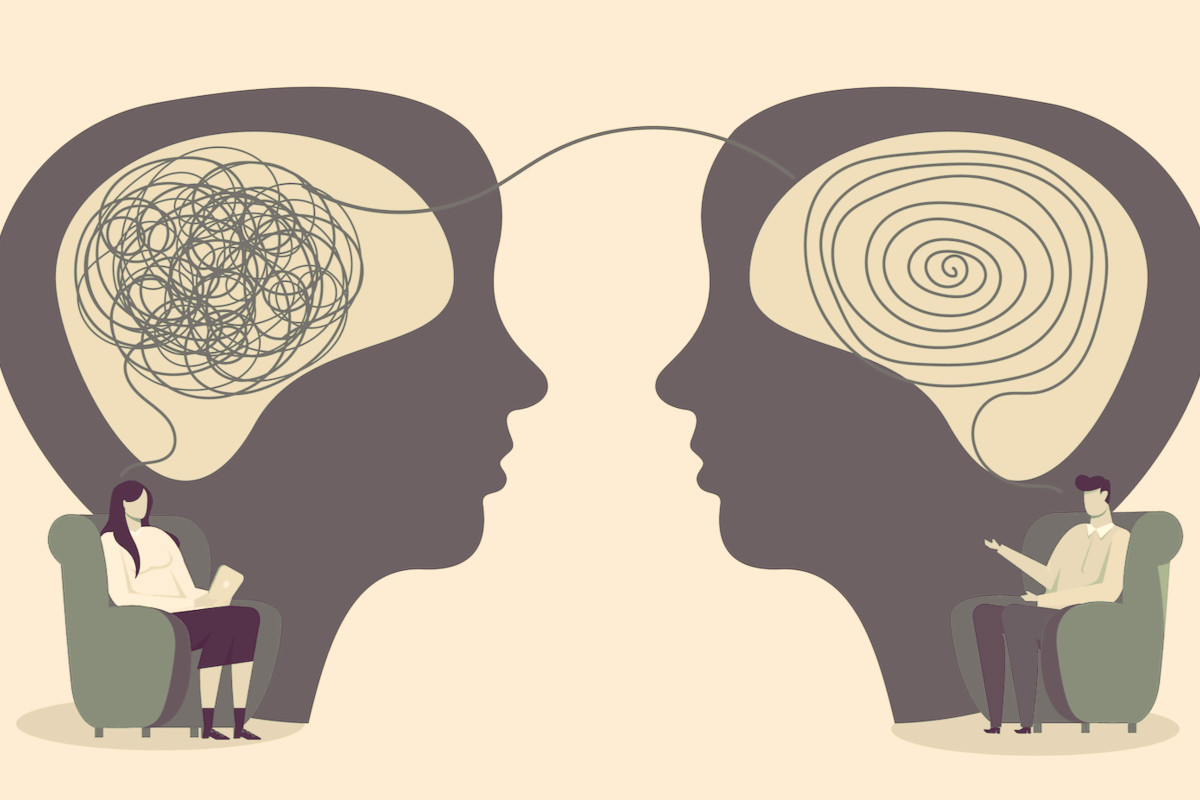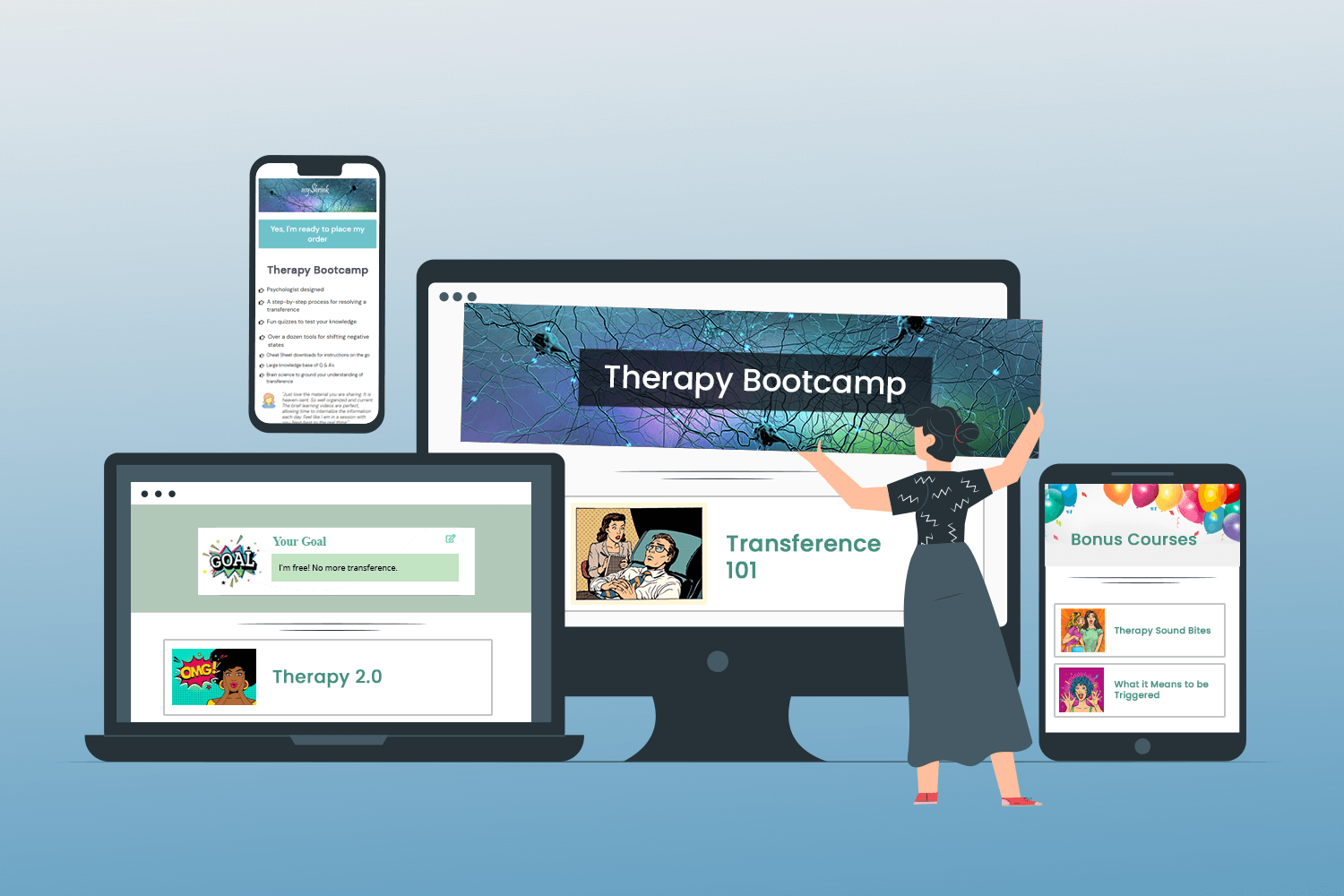

Overly attached to your therapist?
Overly attached to your therapist and desperately want to find a way out?
It's painful to feel so attached you can't imagine leaving your therapist—even when you're not making progress or your budget can no longer accommodate regular sessions.

This post was inspired by my interactions with members of my online program called Therapy Bootcamp.
Therapy Bootcamp is a client's guide to transference.
Scroll down to the section where I talk about the steps you need to take in order to become less attached to your therapist.
(The section describing the specific step by step process for addressing strong attachments towards your therapist is inside Therapy Bootcamp.)
As you know there's no guarantees that a strong attachment to one's therapist can be resolved, especially—in my opinion—when it comes to traditional talk therapy.
I've been fortunate to work with many who have been suffering from transference and have successfully worked it through. This experience has helped me to identify what needs to happen to fully resolve a transference including a few reasons why people have suffered needlessly with their therapy.
Not every client I see is open or ready for the work I suggest. That's okay. And there's clients who for whatever reason didn't like the sound of my voice or my particular personality. Also okay.
For the clients who are receptive and who have previously worked with other therapists, the feedback is similar. While the other types of therapy - notably and collectively referred to as "talk" therapy have been helpful in understanding themselves, they've noticed that it's the work in our sessions that have fundamentally changed them at their core.
I'm not being modest when I say, it's not about me personally. For sure I try to be emotionally available to my clients so I know that's a factor in their healing. However, I don't think I have any unique aspects of my personality that's giving them this edge.
I believe their success is because we're working experientially.
Intellectual discourse, that is, merely talking about events, is not enough for change.
Indeed, insight is unlikely as well to change the brain, that is and unless, the change has already occurred and clients are now able to make meaning of their experience.
One of the key reasons I feel transference becomes dragged out needlessly relates to the lack of safety clients feel. From my experience working with clients who had left their therapist, they were rarely given instructions nor given any tools to help.
Indeed, I've heard many stories of clients sitting in agony in their sessions not knowing what to say as time was ticking on. They have no idea, no instructions on what needs to be talked about beyond explaining their initial pressing matter.
While you feel your therapist isn't necessarily going to physically harm you, it doesn't mean you're going to feel emotionally safe enough to open up enough to access the deeper recesses of your mind - where the work needs to happen.
At the other end of the spectrum, is the issue of spending too much time talking about things that are not essential to your healing or conversely jumping into deeply painful memories when you barely know your therapist.
Merely talking about the problem is rarely healing
When we're in distress, sometimes we need to get things off our chest much as you would with a trusted friend. The release is comforting.
You want to ask yourself does it change you or is it a bit of a release for temporary relief?
The trouble starts right during the beginning sessions. In fact, in my view many therapists are apt to not only allow clients to recount painful stories from their history, they actively encourage it—when there's been no time given for the healing of that memory.
Don't get me wrong. It is important to talk about deeply hurtful memories. Timing is key. It's very important to process it right there and then and not to use it as a launching pad to other memories.
You see the issue is that once you begin to talk about an event or circumstance, all the emotional energy related to it, is now pulsing through your body and mind. If you want deep changes in the brain, now is the time.
It's important that you use this exact moment in time to do the deep healing work. You don't want to miss this opportunity. Especially if this is the first time you're speaking of it.
The next time you speak of the memory, the emotional energy won't be the same - it will often lose some of its strength. That means you're not having access to the deeper areas of the brain where those memories reside.
This is the time for healing. Hopefully, your therapist will have their own set of tools on what needs to happen and can explain to you what healing can be done.
If this is later on in your work and you have a solid trusting relationship with your therapist, it's your therapist's emotional availability that's going to make the difference. It's what your therapist says at that pivotal moment - based on your history - that can make a big difference.
If there's a dismantling of an essential truth or a limiting belief, transformative change can be swift.
If it's the beginnings of your therapeutic work, and you don't have that relationship established then it's important that you know what needs to happen for you to heal —even if your therapist doesn't. Remember, it's your life.
If there's no immediate steps given to help you contain and release in a timely manner the moment is lost.
Therapy can't be merely a catch-up session where you recount the week's activities. You're losing out on a valuable opportunity to move closer to getting through your transference. And inadvertently - and through no fault of your own - you're letting your therapy take longer than need be.*
Your therapist is not your friend and if you're acting as if that's the case, it's important that this be addressed ie. the elephant in the room need's to discussed and worked through. If your therapist brings the issue to light, hopefully you're also provided with specific tasks you can do to move through these strong attachment feelings and onto being more whole and kinder to yourself.
BTW, it's helpful to hear clear instructions on what 'working through' an issue entails.
*I feel it's important that therapists take charge of the session so clients aren't using the session as a replacement for friendship. Clients come to therapy for help and often require guidance. However, not all therapists take the step of addressing the issue openly when they see the issue above (possibly because they feel this is just part of the work).

Just know that it's in the deep areas of the brain where the change needs to happen if you're to move through your transference.
You can't merely "think" your way through.
So, as long as your therapist continues using "talk" therapy exclusively, it generally means your therapy will take longer than needed.
Keep in mind that creating safety is just the beginning. Once your mind body senses safety, you can then move onto addressing the deep seated attachment issues - the main source of transference.
Signs of feeling unsafe and feeling overly attached
Odd as it sounds, many people have no idea whether they’re feeling safe. I’ve had tall, strong looking guys in my office who say they feel "safe" but when it comes down to it, it's clear they're not.
You see, there's a big difference between you feeling safe and your primitive, reptilian body-based brain feeling safe.
Because when I ask them to pause and sense into the sensations in their body, they notice the unmistakable signs of fear…
- tight feeling in the chest,
- hands are locked together,
- shoulders are hunched to the shoulders (braced against a potential threat),
- ankles are turned inward,
- toes curled,
- clammy, tense hands,
- collapsed on the couch.
If these sensations or symptoms sound familiar to you, there's a chance your brain is too overwhelmed for the necessary learning to occur.
Why might you be feeling "unsafe" even when you feel your therapist is heartfelt and emotionally available? Read on . . .
A kind, heartfelt therapist—a double edged sword
When you establish a good working connection with your therapist, you often create sufficient safety to allow yourself to access feelings you might not have otherwise.

Not always though.
Sometimes the more kind and emotionally available your therapist, the harder it is to open up.
Sounds contradictory?
It makes perfect sense when you understand how memory is stored in the brain.
Intense feelings trigger memories when you felt the same way
To really understand why you might have so much fear, it's important to appreciate that the experiences underlying transferences occur early in life. Transferences surface only when the conditions are right and harken back to when you were similarly dependent.
When transference arises in therapy it's a type of re-creation of the circumstances that you experienced back then. But now, owing to your connection, it's an opportunity to finally fulfill a certain stage in your development.

Childhood and infancy memories continue to influence our sense of self well into the future forming what's known as our inner child.
You may also know that as an infant you're totally dependent on your parents for your survival.
Your connection to them figures strongly in your day to day activities.
Alongside those heartfelt feelings towards your therapist will reside similar memories of your life when you experienced the same strong emotions as an infant/toddler.
(That's what being triggered is all about.)
So what happens if alongside those strong feelings you once felt as an infant there was some inconsistent caretaking going on (eg. mother/father's stress/anxiety, neglect, abuse, parent's depression).
The feelings associated with negative memories are going to wrap around these present day feelings and naturally make you feel a little on guard. You're worried about opening up, getting even more attached and then, as before, something bad happening (ie. like Mom or Dad not being there when you're in need).
With a transference, you're tapping into these early as yet unprocessed feelings and fears.
In other words, the stakes are high. A lot is riding on your connection to your therapist. You don't want a repeat of what happened back then when you're weren't getting certain needs met.
Making sure you have the right ingredients to resolve your transference
Fortunately, you do have the right components to make up the normal stage of development that you missed. Moving beyond transference means taking the steps to provide your younger self with these experiences.
In essence, you get the chance to fill in the missing pieces. It’s actually not that important why you missed this stage other than to know it wasn’t your fault.
Best of all, these interactive experiences with your therapist expand your capacity to regulate emotion. (More on that exciting topic later.)
Here’s the rub though…
The conditions that 'moulded' the brain back then must be in place in order for your transference to be completely resolved. But with a good therapeutic alliance - you already have the most important condition.
What might those other conditions be?
First understand that the infant/toddler/youngster’s world is primarily a non-verbal one. In fact, the language centres in the brain don’t come online until 18 months.
When we’re young, we learn through our bodily senses. We feel, sense, touch. We move our body through space.
We don't learn through words as much as through experience. We play with objects in our environment, we explore, we experiment.
So one of the more important aspects of the work revolves around your feelings as you’re sitting there with your therapist. That's the basis for the "experience" the brain is looking for.
It’s important to manage these feelings just so, in order to have your transference fulfilled. The brain learns best under certain conditions that, if met, cement in the changes. This requires a whole brain experience of safety in the nervous system.
Feeling safe and being overly attached to your therapist
There are two main ways to feel “safe” in your session. The first one that most people are familiar with is by working through tough emotional material. All good therapy entails this.
Some folks however have a hard time even getting to first base. They can't open up enough to get to the deeper emotional material!
This can happen even with the kindest, most compassionate therapist. I know this first hand. (In fact, a I've tried to explain above, there are solid reasons why this type of therapist can make things much harder for you.)
Letting go of your therapist
As you begin to feel safer and as your therapist is able to meet you in the present, authentically and with an open heart that “attuned” care will help you to move through and resolve your transference.
If this proves to be a roadblock for you, you can learn how to find safety within yourself. That way you can learn to manage your fears enough to open up and experience what you need to in your therapy.
Remember, you can’t just tell yourself to “feel safe”. Feeling safe depends on the primitive lower brain - the reptilian lizard brain and the limbic system combined.
Creating safety isn't a one-off experience. The feeling of safety is on a continuum. To change where you exist on this continuum requires consistent effort. Remember, this "learning" can't come from reading a book. You need the right kind of experience if you're wanting to make a dent in how you sit and speak with your therapist.
You'll also need a whole different set of tools - tools you may have known about long ago - but are not forgotten. They're body-based.
- Ask yourself how well you bring up touchy subjects between you and your therapist.
- How well do you make eye contact?
- Do you routinely deflect conversations away from emotionally-laden topics for easier "these are the events happening in my life" type of sessions?
Then look around at your life.
- Are you able to step up and advocate for yourself?
- Is people-pleasing your go-to-reaction when faced with someone else's needs that conflict with yours?
These issues require a foundation of safety even before you begin to work on them.
Dr. Susan LaCombe aks Shrinklady
Personal Musings
When I first responded to Just Me many years ago I knew I was on tricky ground. I suspected that she was having a similar experience to what I had many moons ago. I worried that her therapy would flounder as well.
Having found an approach that proved to be a life-saver for me, I also knew that it was not readily available.
Nor could I suggest she find another therapist. When you're emotionally attached as Just Me was, it could potentially re-traumatize her to deal with coping with a new therapist. Much as some therapies inadvertently do, that change could create such an emotional storm, she might never recover.
Most importantly, having formed quite an attachment to her therapist, (and based on the available research at the time) I believed the work going forward was really with her relationship with her therapist. That's where her greatest chance for success lied.
The challenge was to help her get more from her therapy. How could I help her feel safe and embrace the kind of work I know she needs.
What she needs is a roadmap, I thought.
- She needs to feel safe . . . safe enough to access deeper aspects of herself (around unmet needs and experiences) and then safe enough to speak those needs; (Sadly I don't think she's developing these skills so I anticipate it'll be a long journey for her.)
- She needs to understand the science of how change happens in the brain, specifically how emotional patterns are first laid down. (With this information it naturally leads one to know what conditions are necessary to re-wire or overwrite old patterrns);
- Once armed with the brain science she needs to know the specific techniques to change different physiological states (eg. where she's less likely to be flooded). Most importantly, she needs to use these techniques to get herself to a place where her brain is primed for change;
- Finally, she needs to know the kinds of specific healing experiences are necessary for 'filling the gap' in her development. Then, either on her own or with her therapist, she needs to use these techniques to actually create the healing scenarios her emotional self craves. At that point, her transference is well on its way to completion.
New! Rate this article (anonymously)
Was this article helpful to you? Let others know.
Thanks in advance for your feedback
Dr. Susan LaCombe, Rebel Shrink
How to work through feelings of being
overly attached to your therapist
(available inside Therapy Bootcamp)
Wondering what Therapy Bootcamp is all about?
Transference can be overcome. However, it can't be achieved through simply "thinking differently" or by gaining a deeper intellectual understanding of transference. It requires a completely different approach—one that is experiential and closely resembles good therapy.
In Therapy Bootcamp, you’ll not only learn what's required but also be encouraged to use transference exercises to achieve your goal of becoming transference-free. You’ll identify the exact experiences needed to complete an emotional developmental task, which is at the heart of transference. This task, in Just Me's situation, relates to the universal childhood experience of being totally attached to a parent.
As long as the task remains unfinished, transference continues as a means of attempting to complete it. The Therapy Bootcamp approach is balanced with cutting-edge knowledge on how to best facilitate brain change.
The goal is to move beyond your attachment towards your therapist. While you may still be fond of your therapist, the obsession will diminish.
Your first task is to develop skills using tools that manage different emotional states, helping you shift out of negative emotions. For example, this would help someone like Just Me feel safe enough to express her emotions with her therapist.
Once you've developed these skills, the next step is to mine your emotions for key information about emotional beliefs and unmet needs from your childhood experiences. The tools provided will help you navigate these emotions more comfortably.
Finally, you’ll create and provide yourself with corrective emotional experiences that complete your transference. The program includes specific ideas and methods for achieving this.
Understanding the conditions under which the brain learns best is also crucial, and this information will be a part of your learning journey in Therapy Bootcamp.
Click the image below to sign up for Therapy Bootcamp today.



Just Me, Michigan, USA
Would it hurt if my therapist said those things?
I have been in therapy for just over two years and I began to notice transference feelings for my therapist after the first 4 months. It started as sexual attraction which threw me for a loop because I am a happily married hetero-sexual female and my therapist is also female.
I became distraught in thinking that something is terribly wrong with me, that if I confessed my horrible feelings for her that she would find me disgusting and terminate my therapy (abondon me). I spent many painstaking hours researching this phenomenon until I finally found the courage to confront my therapist. (The book "In Session" by Deborah Lott was invaluable for me)
I was relieved to find out this was normal and that she did not find me disgusting and absolutely would never abandon me. She has remained a stable force in my life and two years later after working through multiple traumas I am ever more attached to her maternally. I still have a physical attraction, but most of my feelings are clearly my little girl-self desiring her to mother and nurture me.
I confessed to her recently that sometimes I wish that she was my mother (although impossible because she is only 10-12 years older than me.) While I am still greatly uncomfortable with my childish longings and feelings for her I know that expressing myself is always healing. But I still find it frightening. I still feel that there is something wrong with me and that she will finally get so frustrated with me and give up saying "Oh THAT again." And I know better!
Sometimes I find myself crying because I miss her so much between sessions and because she cannot be my mother. Then I feel so foolish for having these thoughts even though I intellectually get why I do. I even feel obsessed with wanting to know more about her even though she is not rigid about sharing some info about herself. She keeps good boundaries and yet is very authentic and genuine. I feel lucky to have her as my therapist but I am still struggling with my overwhelming attachment to her and still afraid to fully expose myself.
Reading your site and Robin Shapiros website gives me a feeling that I am not alone and that letting it all out is exactly what I need to do. It feels so BIG inside of me, but I am still afraid to let it all out and I am not always certain what all of it really is. Sometimes I wish she would just say "I know you're feeling something so just spill it." But she is ever patient waiting for me to work up the nerve to do so on my own.
She has told me that she desires for me to be able to finally express my needs and yet I resist. Partly because I know she can't really meet my needs. She cannot magically become my mother, she cannot hold me and let me cry like a child in her arms, she cannot love me the way I want her to love me. I want her to tell me that i am important and lovable to her, and that she thinks I am intelligent, but she seems more inclined for me to adopt those beliefs on my own.
Would it hurt for her to say those things to me?
In regards to my wanting to know more about her I find myself seeking info on the Internet about her desiring to find the slightest tid-bit then feeling guilty if I learn something she may not want for me to know. This is all so hard to express let alone deal with. I hope that I make some sense. I can't really tell myself. Thank you
Shrinklady
Hello Just Me, I was really moved by your story. It sounds as if you're on the right track . . . slowly, ever so gently, opening up and tapping into your unmet needs. I'm impressed how hard you are working to understand what's going on for you.
You may already be aware that the tears for your therapist are no doubt stemming from earlier losses. Your therapist has helped you to access these yearnings. And, now she can help you heal through the feelings that are attached to her.
It is perfectly natural for you to be thinking of her after your sessions and to have a desire to be with her. Missing your therapist is predictable. She is giving you what you didn't get in your early years . . . unconditional love. Your mind will take you there whenever you need to be supported. I would encourage you to receive the memory of her as you need to. Try not to hold back or judge your thoughts and feelings. This is your body mind trying to heal.
Eventually, that little girl will have enough love so she can grow up.
Clients have told me that the most pivotal times in therapy were when I shared with them how I felt about them. These honest heartfelt moments helped them to deeply heal.
As I say the words they need, I encourage them to receive it as much as possible. They have told me that they remember these times for when they are feeling down and lonely. (We do the same thing when we think of a friend during difficult times.)
In the absence of hearing the words you need from your therapist, I suggest that you imagine her saying those things and then take a long moment to receive it and really take it in.
Allow the image of her love and her words to wash over you. I think the more you allow yourself this comfort, the less compelled you will feel to seek out information about her and the greater your healing.
All the best,
Shrinklady
I received this wonderful update from Just Me after posting my reply.
Just Me
Thank you Shrinklady! Your words are very kind and soothing. This has been a long hard journey at times, but the change/metamorphosis has been so healing. I receive so many comments from people about something being different about me. (For the better.) It has been a lot of hard work and it is so worth it. I have worked through multiple traumas and my T says that my attachment is my BIG trauma. But I am gaining exposure and she has been wonderful about it.
I like how you related that you say the words your clients need to hear. My T has dropped some hints, but it seems as though she wants me to pick it up by experiencing and not just hearing, but I long to hear it. I really do. Maybe I should tell her that. Its Funny how you suggested that I imagine her saying the words I need to hear, I do that all the time. But I think I can do that effectively because I also do get a sense that there is a love or affection there on her part.
I want to tell you that I really appreciate how you take the time to reflect on and to respond to so many posts despite your busy schedule as a Therapist. Hearing a Therapist’s side of the relationship is touching. I hope you can continue to be available.
Much heartfelt thanks!
Just Me